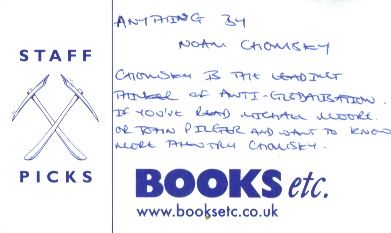There is a good interview with Bruce Schneier in Businessweek, discussing whether tradeoffs of civil liberties for increased security are effective (generally no) and the problems of overreliance on technology rather than common sense. I have written here about Schneier before. Suffice to say he is a very smart guy – a leading expert on electronic security – and it is worth paying attention to what he says.
|
|||||
|
US News and World Report has an article that is well worth reading on how mobile phones are being used as tracking devices for all sorts of purposes, as well as how other consumer devices are also slowly evolving into tracking devices. Reading the motoring section of the Sunday Times on the weekend, I found the following extraordinary letter to the editor from a Maurice Hyman of London
There are a couple of issues here. The first is simply that I find these procedures to be unbelievably heavy handed. In my life, nobody has ever needed to take my fingerprints. I like it that way. I believe that rental car companies do have the right to impose conditions like this on their customers. However, if they do, I also have the right to rent my car from another company, or to not rent a car at all. Therefore, if I book a car or pay in advance, then I must be informed in advance of any such conditions. Springing them on me at the last minute when cancelling the booking and going to another car company has been made difficult and when I haven’t been informed in advance is wrong. Taking someone’s photograph for this kind of purpose without clearly informing them and giving them a chance to object is also wrong. (Of course the reason they present it to you at the last moment is to increase the hassle to you of objecting. If they mentioned it up front, they would lose business). Finally, the strategy of blaming somebody else (often the government, but here the insurance companies) for having to take away people’s liberties seems to be becoming more and more common. It very likely is the policy of the rental company, but saying “It is all the fault of the insurance company” is a way of shifting the blame and avoiding responsibility. Probably if you ask the insurance company they will blame the car rental agency. Presumably, if the car goes missing the rental company will share this information with the police. Even if it doesn’t, one can see lots of ways in which your fingerprints could end up in all sorts of databases. And once such databases exist, it is hard to imagine the police not ending up with access to them. The final point is a positive one. Being photographed without being asked first and being asked to give fingerprints is something that annoys people like Maurice Hyman, sufficiently to cause him write a letter to the Sunday Times about it. (I don’t know whether he agreed to be fingerprinted. He didn’t say). Whatever may be said for that newspaper, its editors care sufficiently about such things to print the letter. My Hyman’s words were that it made him feel like he was not in Britain. Traditionally, the British people have had more civil liberties than people in many other countries, and they are proud of this and they think Britain is a better country because of this. They notice and are bothered when people try to take them away. If the government fails to take note of this, it will likely learn it the hard way. It is the end of August, and the Labor Day holiday weekend is here. This is considered by the film industry to be the end of the summer movie season. Since Steven Spielberg invented the modern blockbuster when he made Jaws in 1975 (and due to the near-coincidental arrival of air-conditioning in most movie theatres), this has been the most important season for the Hollywood film studios. I am going to be mildly self-indulgent and give the readers of Samizdata a lengthy overview of what I think happened to Hollywood this summer, largely from a business point of view, but also from a creative point of view. This is going to be much longer than a normal Samizdata article, but I am assuming that my editors will indulge me just this once. Or maybe I shall receive what is known in Samizdata speak as an “editorial spanking”. We shall see. However, I think most of the following is quite interesting. One sad fact is that I am in Britain, and films are usually released in this country anything from the same day as in the US to a couple of months after they are released in the US. Sometimes though it can be longer. What this means is that there are one or two big summer releases I haven’t seen. The most important of these is Finding Nemo, which is being held over until the holiday season here in the UK, despite being the highest grossing film of the summer in the US. However, in order to explain why certain films are hits and some are not, an overview of recent year Hollywood economics is necessary. So, a little digression first. Is this beautiful or what? (Labelled version here. Descriptions of how the Hubble Space Telescope took the photo here). (Link via slashdot). Update: This infrared image taken by the UK Infrared Telescope in Hawaii is claimed to be one of the sharpest ground-based photos of Mars ever taken. (Descriptions here and labelled version here). Sadly, I think that the position of Samizdata’s representative in the first hundred may already be filled. Further Update: Having just adopted the advanced astronomical technique of opening my window and looking in a vaguely easterly direction, I have to agree with Dale that Mars is extraordinarily bright, particularly given that it is only about 30 degrees above the horizon right now, and I am in the middle of the light pollution of a metropolitan area of eleven million people. I will go out and have another look in a few hours when it is directly overhead, and I have to go somewhere on the weekend where there are fewer lights. I also have to take careful note of what other planets are viewable and where they are in the sky, as the comparison is no doubt interesting.
— Mark Steyn’s advice to people who would send him e-mail. On Wednesday evening, for reasons too complicated to explain (which partly have to do with the disaster that is transport in London), I found myself walking down the high street of Clapham in wonderfully multi-ethnic south London. (This is not the same place as Clapham Junction, which is some distance away). This area seemed to have more nice bars and restaurants than it did the last time I was there, and half way down the street I saw a place called the “Bierodrome“. Despite this slightly silly name, I looked at the menu beside the door and saw a vast number of fine Belgian beers listed. As I am a little partial to fine Belgian beer, I walked in and sat down. Most of the beers were bottled, but they had around ten on tap. I ordered a Grimbergen Blonde. This is not an especially obscure beer, but it is certainly a good one. When you go into a bar in Belgium, every beer has its own special glass. These have the name of the beer on the side, and vary in shape depending on the kind of beer, as (it is claimed) different styles of beer taste best in different shaped glasses. Some of the weirdly curved glasses also look kind of cute. The size of the glass also varies from beer to beer. This definitely makes sense, as beers differ greatly in texture and alcoholic strength. It also gives Belgian bars some of their character. Walk into a good bar, and there will be hundreds of different glasses on the shelf behind the barman. Belgian beers are often 7%, 8%, 9% alcohol, and these are best consumed in relatively small quantities. The Grimbergen Blond was at 7% only moderate by Belgian standards, but rather strong by English standards. When I ordered the beer, I didn’t specify a size, as I just expected that I would be given a size appropriate to the beer in question, as happens in Belgium. However, I was given a cute, curved, Belgian style glass, but very big. I asked the barman, and he explained that it was a pint. You see, I was in England. If you are in England and order a beer without specifying the size, a pint is what you get. With English beer this is excellent. In fact, it is superb. English beer is usually (but not always) weaker than some continental drinks, and lends itself to larger glasses. That was fine. → Continue reading: English beer measures and the liberal French state. Yesterday, there was an article in the tabloid section of The Times (which Samizdata does not link to, although the author of the article has also written this book on the subject), on the treatment of the Uighur people in the Xinjiang province in far western China, the point of which was that this (Muslim) ethnic minority have for a long time been treated appallingly badly by the Chinese authorities, that the world largely doesn’t know about this, and that this is bad. This is all entirely true, and the Chinese authorities are indeed a nasty bunch of thugs, but the point I am getting to is something else. For three quarters of the way through the article I find the following statement
Is it me, or is there something deeply odd about the way this has phrased? Rather than a crackdown occurring as a consequence of September 11 itself, a dreadful atrocity caused by Muslim fundamentalist fanatics, it is somehow the consequence of the fact that President Bush and America has responded to this. (America is maybe guilty of neglect in this case, but somehow implying that it is in any way George Bush’s fault is surely stretching things somewhat). And the fact is the same organisations rooted in Saudi Arabia that funded and spread the fanaticism that led to September 11 are also doing their best to spread that same fanaticism to every Muslim in the world, and very legitimate grievances such as this one are a tremendous source of recruits. Regardless of how badly they have treated their ethnic minorities (and in this case the answer is “extremely badly”) I do understand why the Chinese are worried. The article goes on
This is all largely true as well. The trouble is that it is also true about the forms of Islam traditionally practiced throughout large portions of (non Middle-Eastern) Asia. Islam in Indonesia, Malaysia, the Phillippines and various other places is traditionally relatively moderate and often mixed with pre-Muslim practices. However, the flow of oil-money from Saudi Arabia to the rest of the world has led to a spread of fundamentalism and terrorism to many of these places, and has made it very difficult for the opponents of such fundamentalism to speak out. Wherever there is a grievance, this money and this influence has largely had an influence akin to pouring petrol on a fire. A war against the Soviet Union in Afghanistan, which was fighting another very legitimate grievance, somehow evolved into the Taliban. To be truthful, the situation of the Uighurs is sufficiently wretched that not much will make their situation better short of the complete collapse of the People’s Republic of China. The developed world’s neglect of this particular situation is certainly less than admirable. But a further spread of Islamic fundamentalism to that part of the world may well make it worse, and certainly won’t make it better. And a great many things we can do to minimise that spread are, in my opinion, worth it. And given that the fundamentalism has spread and is spreading mostly from Saudi Arabia, anything that can be done to reduce our dependence on Saudi Arabia and anything that can be done to isolate Saudi Arabia is likely worth it, including the invasion of and occupation of Iraq. This afternoon I stopped off at my local branch of the Sainsbury’s supermarket chain to get something for dinner. I picked up a prepared ham and mushroom tagliatelle to heat up in the microwave when I got home. However, I like a lot of cheese on my pasta, so I headed off the the cheese section looking for some parmesan. I walked past all the cheeses in the store, and couldn’t see it. I then walked past all the cheeses again, and still couldn’t see it. On the third pass, I saw a sign on the shelf which said
(I didn’t have a digital camera with me to photograph the sign, and of course I wouldn’t dream of stealing a sign off the shelf of a privately owned shop, particularly when it is doing something useful like helping people find their correct cheese). Yes, it is the type of EU law Gabriel Syme was talking about recently, in which the EU has been drawing up lists of geographical (and other) names used for food products, and has been insisting that the names be used only on food produced in that exact place. Cheese that does not come from the Parma area can no longer be called parmesan. Now, this is problematic, because as I use the word, “parmesan” is a name for a particular type of strong flavoured hard cheese. Yes, it is named after Parma where a lot of such cheese is made, but I personally have no expectation that something called “parmesan” does actually come from there. I do expect that it will be hard, will have a particular flavour, and that it will taste good on my pasta. (If a cheese does come from Parma and does not satisfy these requirements, then I do not think it should be called “parmesan”). I have no difficulty with a law that requires it to be clear on the packaging whether a “parmesan” cheese comes from Parma or not. There is already another more specific name for cheeses that do, which is “Parmigiano-Reggiano”, and I have little problem with this name being restricted to cheeses from Parma, because it has never become generic. Really, though, if the word has become so generic that there is no intent to deceive about the origins of the cheese, then banning all use of the word otherwise is going too far. I think that geographical names are like any other trademarks. If they are not defended, they can be lost. And if they are lost, they cannot be retrieved. And this present EU policy overreaches badly. → Continue reading: Who renamed my cheese? One of the more annoying things about modern large bookshops is that they divide the non-fiction books into a vast number of over-defined categories. This is not a huge difficulty if you are looking for a cookbook, or a book about trains, or a travel guidebook, as it is pretty clear what sections those books belong in. However, when we get to the social sciences things get hazy. If I am looking for (say) one of Ian Buruma‘s books on Asia (which are all worth a read, by the way), it is impossible to know whether the book in question will be on the shelves in “Asian History”, “Eastern culture”, “Travel writing”, “Sociology”, “Chinese History”, or one several other categories, even though if you look at all his books together they are clearly all have a very similar theme. It just does not fit into bookshop categorisation. This is fine if you are looking for a particular book. You just ask at the information counter, they look it up in the computer and they tell you where it is and whether they have any copies. However, if you are trying to find it without help it can be close to impossible. In any event, when I was wandering through my local branch of Books etc the other day, I found myself walking past a section I hadn’t noticed before, labelled “anti-globalisation”. That’s right, they had a section devoted to the works of Michael Moore, Noam Chomksy and the like. People who wanted to read such books can go straight to that section without having to be exposed to anything else. I’m sure they find this very convenient. Even better, the bookshop encourages its staff to recommend books to customers. They even go to the trouble of giving their staff members little cards on which they can write down their recommendations and attach them to the shelves in the store. This is a good practice, as it may help readers find books and it also makes it clear that the booksellers are people who like to read themselves. But, even so, I had personal issues with the anti-globalisation recommendations.  Ugh.  Save me. Seriously, I suspect that the number of people who have read Michael Moore and are not already aware of the existence of John Pilger and Noam Chomsky already is small (or perhaps I overestimate them). I think recommendations like this are better when they refer people who have read something well known to something that is both rather more obscure and also good. And Pilger and Chomsky are not especially obscure, however much I might wish it were so. However, in the chance that there might be anyone walking through the bookshop who might have discovered Michael Moore but not Pilger or Chomsky, I thought I had a duty to save them from this (and also there was a Samizdata post in it). Therefore, although it was a bit naughty of me I removed the little cards from the shelf and walked out with them. (Yes, okay, technically I stole them. However, sometimes the ends do justify the means). As I was walking out of the shop, it struck me that it would be kind of cool to get a few of the blank cards, write out a few book recommendations of my own, and then attach them to the shelves. However, when I thought about it some more, I realised I didn’t need anyone to supply me with a stock of blank cards. For I have the miracles of modern technology at my disposal, and I could produce some of my own. I could go back into the bookshop and leave something like this.  Or perhaps this.  The fun could be never ending. → Continue reading: Globalisation, bookshops, and the Anglosphere A couple of weeks ago, while taking a little tour of Provence, I found myself in Arles, once a great Mediterranean port but today a small town with some spectacular Roman ruins, famous for being the location where Vincent Van Gogh painted many of his most famous works, as well as being the place where he cut off his left ear. In one of the town squares, I found a fairly ordinary and old looking memorial to the events of the second world war.  However, there was a very new plaque on it. Let’s get a closer look.  This is quite intriguing. Unless the servicemen in question did something extremely famous, it is unusual to find a memorial to one or two specific men. (At least, it is outside graveyards). While the sacrifice of every soldier or airman who died is worthy of commemoration and remembrance, the numbers who died were so great that it is not possible. So why these two? Were Lieutenants Tippett and McConnell the only Americans to die in Arles in the war? If not, what did they do to merit this memorial? And why was this plaque not erected until almost 60 years after the action in question? Were more details as to what happened in the war only found out recently? Had some historian who knew what they did long campaigned for such commemoration. One senses that there is an interesting story there, either about the actions of the men themselves, or at least about how the plaque came to be erected. I googled for their names on the internet but found nothing. I am sure that if I wrote to the mayor of Arles to ask, I would receive a letter back telling me the answer. However right now I don’t know anything. Still, if any readers of this site know anything, I would be interested to hear it. And it is worth noting that the citizens of at least one French town felt the need to erect another memorial to the American sacrifices made in 1944 in liberating France as recently as last year. Not everyone forgets. Just following up on what I was saying this morning on the dangers of anti-terrorism laws being applied to situations that do not involve terrorism, Eugene Volokh provides an example of the way in which too broadly worded anti-terrorism laws can be misused. A prosecuter in North Carolina has charged someone who has been manufacturing methamphetamine with two counts of “manufacturing a nuclear or chemical weapon”, because the definition of chemical weapons under the law is
and methamphetamines can clearly be described that way. Because the accused is being prosecuted under the anti-terrorism law, the penalties are harsher (and he may have less legal protection – I am not sure of the details of that particular law) than he would have if he were charged with a normal drugs offence. I suppose we can observe that this is another example of the general way in which people’s rights and liberties tend to get brushed aside as part of the war on drugs, too. |
|||||

All content on this website (including text, photographs, audio files, and any other original works), unless otherwise noted, is licensed under a Creative Commons License. |
|||||


